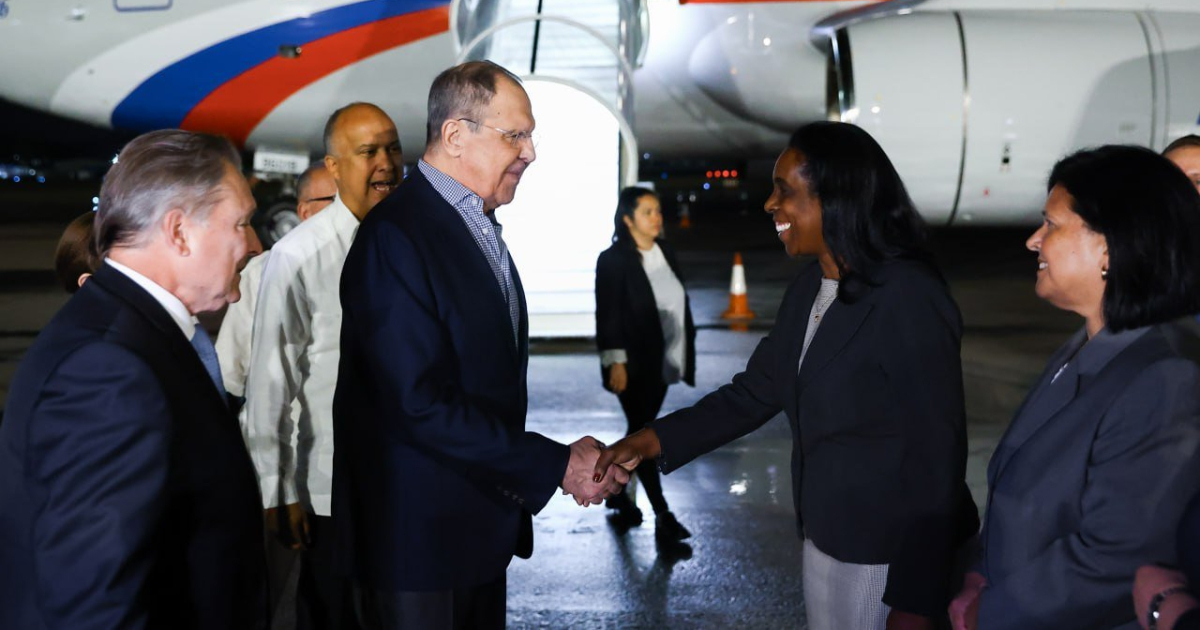
The Minister of Foreign Affairs of the Russian Federation, Sergey Lavrov, arrived this Monday in Havana, on the ninth visit he has made to the country since his appointment to the position, 20 years ago.
The visit is carried out in the context of the biggest socioeconomic crisis caused by the totalitarian Cuban regime, whose purpose of clinging to power has led to the subordination of the country's sovereignty to the interests of Moscow.
A brief use of the Cuban Foreign Ministry indicated that “as part of the program, it is planned that the distinguished visitor will hold meetings” with the president. Miguel Diaz-Canel and with his counterpart, Bruno Rodriguez Grill.
The Ministry of Foreign Affairs (MINREX) did not disclose Lavrov's agenda on this trip, which takes place just a few days before the suspicious death in prison of Russian opposition leader Alexei Navalny, and in the midst of a complex international panorama, with multiple sources of tension fueled by Russia after their invasion of Ukraine.
“Moscow and Havana stand in solidarity regarding the inadmissibility of interference in the internal affairs of sovereign States,” the Russian Foreign Ministry stressed in a statement.
Both countries “are united in their desire to move towards the construction of a just multipolar world order, based on the true equality of States,” according to the Russian Foreign Ministry, which took the opportunity to categorically condemn “unilateral sanctions.”
“Russia firmly supports the demands to immediately end Washington's illegal economic, commercial and financial blockade against Cuba and to remove the Caribbean nation from the unilateral US list of countries that sponsor terrorism,” concluded the statement published on the platform. Telegram.
What can be expected from Lavrov's visit?
Beyond the military geopolitical alliance, the bilateral relationship between Russia and Cuba on economic issues has not just taken off, as noted for Cuban Diary the Economist Emilio Morales, President of Havana Consulting Group and researcher at the analysis center Cuba 21st Century.
“The announced Russian rescue has been much ado about nothing. "Apparently the Russians do not trust the twisted Cuban legal system and have contained the investment impulse that initially seemed to cover several of the most important sectors of the Cuban economy," Morales said.
Last November, Cuba and Russia signed a cooperation agreement in the commercial and economic field until 2030, to "expand and deepen collaboration in various areas, including commercial, economic, scientific and technical spheres."
A year before Díaz-Canel visited Russia in order to increase Russian investment projects on the island "as well as the supply of food and inputs for its production."
After this journey, controversial agreements arose such as the appointment of Boris Titov, head of the Cuban-Russian Business Committee, as advisor for reforms in the Cuban economy, and the offer to Russian companies of the right to use in usufruct of the land of the island for a period of 30 years.
Russia, for its part, has said it intends to become the number one issuer of tourists to the Caribbean nation, and that will support the development of sugar harvests with machinery and credits, in addition to investments in the energy, transportation and food industry sectors, among others.
However, none of the major announcements by the Cuban regime regarding this cooperation have materialized, except a rebound in Russian tourism on the island and the ostensible military cooperation between both regimes.
90 miles from the United States, Cuba continues to strengthen its military cooperation with Russia while tension grows between both powers faced in the Ukrainian war scenario.
At the end of the year, it was known that the Russian president, Vladimir Putin could transfer "smart" cruise missiles to Cuba and Venezuela, with a range of up to 2,500 kilometers, targeting important infrastructure facilities on US soil in case of emergency, according to the Kremlin spokesman Victor Baranets.
The Russian war propaganda apparatus refers more and more frequently to military cooperation with Cuba. All this at a time when the presence of Cuban mercenaries in Ukraine Cubans' concern is increasing over possible secret agreements between Havana and Moscow in relation to that conflict.
At the end of last September, the digital portal represorescubanos.com revealed that the colonel Monica Milián Gómez, military, naval and air attaché of the Cuban Embassy in Moscow and spokesperson in Russia for the Revolutionary Armed Forces (FAR), had been identified as the senior Cuban officer who would be behind the recruitment of Cuban mercenaries for the war in Ukraine.
In mid-July, A training ship of the Russian Navy arrived at the port of Havana while the regime was protesting the presence of a nuclear submarine of the United States Navy (US Navy) at the Guantánamo Naval Base.
A month before, Putin decorated the FAR minister, Álvaro López Miera for contributing to the "strengthening" of military collaboration between both countries.
"Cuban friends confirmed their attitude towards our country, even demonstrated their full understanding of the reasons for launching the military operation in Ukraine," said the Russian Minister of Defense, Sergei Shoigu, at the reception in Moscow of his Cuban counterpart.
Compromising statements of senior Russian officials, uncomfortable press revelations serving the interests of the Kremlin, and a large package of aid and economic cooperation waiting for the final judgment, seem to be the only results that can be expected at the moment from a bilateral relationship that has caused the greatest damage to sovereignty in the history of Cuba.
What do you think?
SEE COMMENTS (2)Filed in: